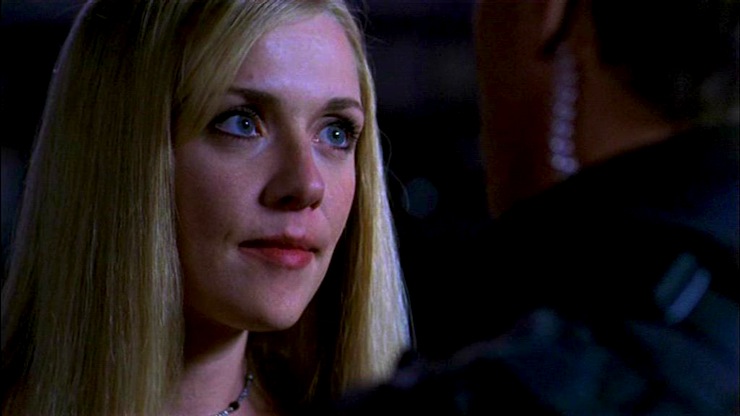Stargate SG-1 Season 3
Executive producers: Jonathan Glassner & Brad Wright, Michael Greenburg, Richard Dean Anderson
Original air dates: June 25, 1999 – March 10, 2000
Mission briefing. After seeing through Hathor’s deception, SG-1 manages to permanently stop the Goa’uld, with the help of a Tok’ra agent, who sacrifices her life. Another Goa’uld is discovered on Earth, having stayed on the planet and keeping his head down as a cult leader: Seth. SG-1, with Jacob Carter, dispatches him as well.
The Asgard agree to make Earth one of their protected planets, and negotiate with three Goa’uld representatives: Cronus, Yu, and Nirrti. The negotiations are soured by Teal’c’s history with Cronus—that particular System Lord killed Teal’c’s father, which is why Teal’c went into service as a Jaffa with Apophis, Cronus’s greatest enemy. They’re soured further by the Goa’uld insistence that the Stargates be buried, but SG-1 revealing Nirrti’s treachery improves their negotiating position, and the Asgard protects them while allowing them to keep the Stargate. (Though Cronus reminds them that the protection ends the minute they step offworld.)
Indeed, they still have plenty of dealings with the Goa’uld. SG-1 is captured by a mercenary working for Sokar and forced to help him capture a Goa’uld—but instead they’re hunting a Tok’ra. The team also stumbles across an old plan of Apophis’s to infiltrate the SGC with brainwashed humans, whom they have to convince that Apophis is dead. Which is all the more impressive because Apophis isn’t dead—Sokar used a sarcophagus to resurrect him and banished him to the planet literally called Hell, where he had to serve Sokar. But with the unwitting help of SG-1 and the Tok’ra, Apophis is able to kill Sokar and take over his forces.
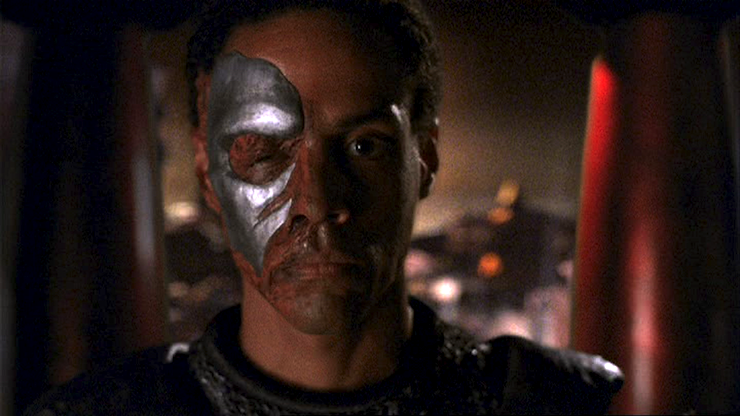
Two other encounters hit much closer to home. SG-1 tracks down Amaunet, still using Sha’re as a host, and Teal’c is forced to kill her to save Jackson. However, before she dies, Sha’re is able to get a message to Jackson telling him to look after the child she gave birth to, known as the Harcesis, a human born with the genetic memory of the Goa’uld. Eventually, with help from both Bra’tac and a series of gate addresses the SGC received from the Asgard that the Goa’uld don’t know about, SG-1 finds the mythical world of Kheb. Jackson has his first encounter with ascended beings in general and Oma Desala in particular (and hoo hah is it far from his last).
Also Klorel crash lands on Tollana, and the Tollan hold a hearing to determine the whether or not Klorel should be removed from Skaara’s body, with Jackson arguing against the Goa’uld Zipacna. Jackson wins the argument, and Klorel is returned to the Goa’uld without a host, while Skaara returns to Abydos.
Past missions come back to haunt SG-1 as well. A weapon made by Machello (from season 2’s “Holiday”) messes with Jackson’s head, the quantum mirror that sent Jackson to an alternate reality (in season 1’s “There But for the Grace of God…”) allows Kawalsky and Carter from another reality to come through to our world, and SG-1 encounters Linea, destroyer of worlds (from season 2’s “Prisoners”), except she’s lost her memory (and her old age) and now goes by Ke’ra.
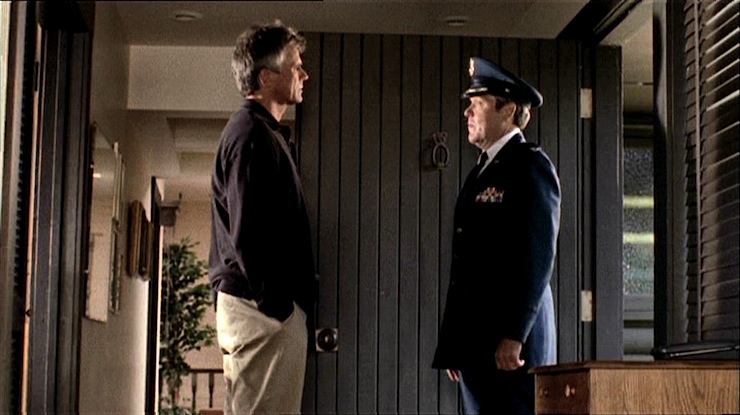
The NID remains a threat, though when a contingent of aliens take over the SGC and disguises themselves as its personnel, Carter (who along with Teal’c is immune to the aliens’ technology) has to ask the NID for help, to mediocre results. Maybourne’s rogue NID operation is caught stealing technology from the Asgard and the Tollan, but O’Neill goes undercover to shut them down (and preserve two valuable alliances).
Plus, of course, there’s the usual seeking out new life and new civilizations. (Ahem.) There’s a planet where the adults literally learn from their children, a planet that has an AI that won’t leave SG-1 alone, a planet that is divided by differences in belief about who used the Stargate to imprison them with SG-1’s presence risking turning a culture war into an actual war, a world that they try to rescue from an asteroid shower instead has its gate destroyed with O’Neill trapped there for a hundred days, and a planet where our heroes are considered demons and witches.
On a personal level, Carter manages to get her father and brother to talk to each other again, Jackson loses Sha’re but reconnects with his eccentric grandfather, and O’Neill falls in love and helps save Skaara.
The season ends with the biggest game-changer yet, as a new foe is introduced: the Replicators, a foe so deadly, even the Asgard can’t stop them…
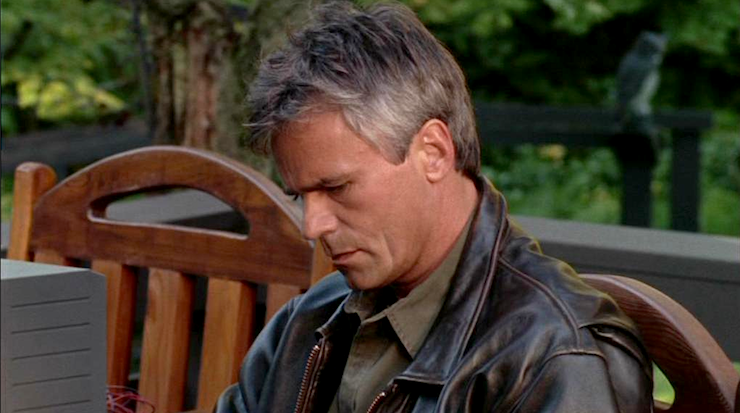
Best episode: This is a tough one, as this season has several really good episodes, but nothing that particularly stands out. If forced to choose a best, I’d have to go with “Shades of Gray,” just because it was so enjoyable, and had such a satisfying ending. Richard Dean Anderson’s performance is superb—indeed, he’s playing an O’Neill who’s much closer to Kurt Russell’s interpretation of the character—and the episode makes excellent use of several previously established elements (the Tollan unwillingness to share technology, the Asgard’s power, Maybourne’s skeeviness, the NID’s shadowy agenda, O’Neill’s occasional militancy, not to mention his desire to retire to the planet he spent a hundred days on just one episode previous).
Honorable mention to “Fair Game,” which gives us our first look at the greater tapestry of Goa’uld politics, and introduces three interesting new Goa’uld in Nirrti, Yu, and Cronus; “Learning Curve,” which has a nifty science fictional premise of kids learning then dumping the nanites and becoming ciphers, with a really strong performance by Brittney Irvin as little Merrin; “Forever in a Day,” the heartbreaking tale of Jackson finally losing Sha’re; and “Nemesis,” a sharp, thrilling action piece that introduces the Replicators with style.
There are also a lot of good, solid adventure stories here, a particularly solid bunch of them. Nothing that stands out as the best ever, but all rollicking tales: “Seth,” which puts a Stargate spin on the cult-leader cliché (and watching O’Neill mess with the ATF guy is kinda fun); “Deadman Switch,” another cliché story elevated by a superlative performance by Sam Jones; “Jolinar’s Memories” and “The Devil You Know,” taking advantage of its two-part structure to give the characters (particularly Carter) some excellent bits, and also brings Apophis back as the big bad in impressive fashion; “Foothold,” a solid alien-invasion story; “Pretense,” a very Stargate-y courtroom drama (with some excellent scenery chewing by Kevin Durand as Zipacna while wearing the stupidest hat ever); and “Crystal Skull,” a good vehicle for Michael Shanks as an out-of-phase Jackson, and a fun little adventure.
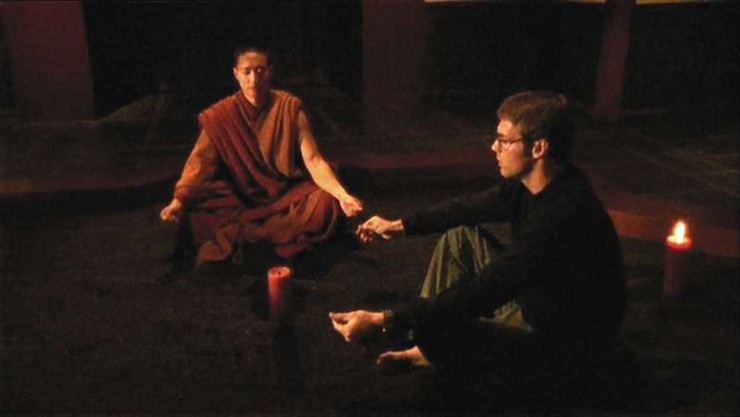
Worst episode: “Maternal Instinct.” I was always a little iffy on the ascended folks and their insistence on spouting vague sub-fortune-cookie nonsense to the point of self-parody. It’s to the show’s credit that they hung a lantern on it as time went on, and even made it clear that their behavior is actually pretty crummy, all things considered, but in this episode that introduces ascension, it’s a friggin’ disaster, with poor Terry Chen reduced to uttering gibberish that substitutes for profound. And then on top of that, Jackson’s “journey” is all a fake to get him to turn over the Harcesis. Snore.
Dishonorable mention to “A Hundred Days” and its sodden romance (wasting a very good actor in Michelle Greene); “Legacy,” which focuses so much on being an acting exercise for Michael Shanks that it forgets to tell an interesting story (this will happen again in season 7’s “Lifeboat”); and “Demons,” which proves that the Unas just aren’t that interesting (which won’t stop the writers from doing Unas-focused episodes over and over again).
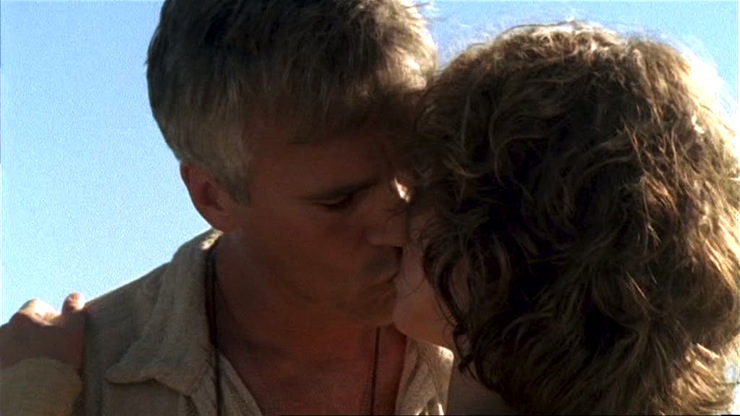
Can’t we just reverse the polarity? The SGC is able to construct a naquadah generator, thanks to the Orbanians, and that tech will prove hugely useful going forward. The stun-weapons known as Intars, used by the brainwashed fake SG teams that Apophis has trained to infiltrate the SGC will also prove useful in the future, while the memory aids used by Hathor in the season 2 finale are also used by the Tok’ra to help bring Jolinar’s memories into Carter’s conscious mind.
For cryin’ out loud! O’Neill gets to be implanted with a Goa’uld by Hathor, has to lead the negotiations with the Goa’uld over becoming an Asgard protected planet, falls in love while stuck on a planet for a hundred days, goes undercover to stop the NID, and is asked by Thor to help fight the Replicators. Busy year…
It might work, sir. Carter gets a well-deserved promotion to major early in the season while also getting to work with her father on several missions. Her blending with Jolinar proves particularly useful on one of those missions, when they have to rescue him from Sokar’s prison, plus that blending makes her immune to the aliens who invade the SGC.
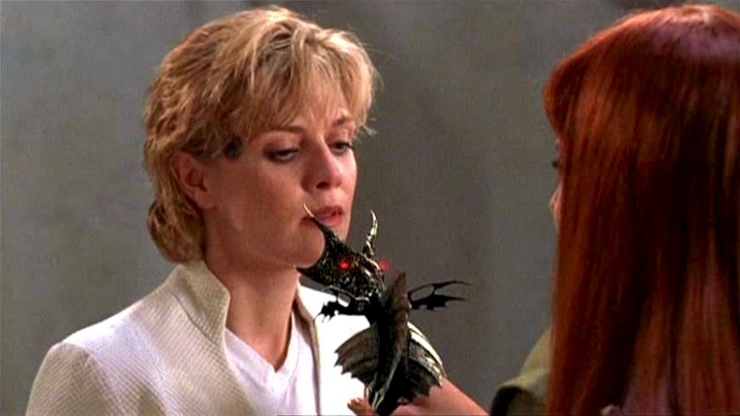
I speak 23 different languages—pick one. Not a banner year for Jackson: an old weapon of Machello’s makes him crazy and his wife dies (but she gives him a new purpose before she does). However, he does get to prove his grandfather’s crazy theories right and find out about ascension, which will prove useful down the road…
Indeed. Teal’c gives a rousing speech in the season premiere that is his first real attempt to expand the Jaffa rebellion beyond himself and Bra’tac. We also learn that his father was killed by Cronus, under whom he served as First Prime, and Teal’c has sworn revenge against Cronus for the act.
You have a go. Hammond finally gets to go offworld, as his response to being told to stop using resources to find SG-1 is to go to Chulak and ask for Teal’c and Bra’tac’s help. He gets to copilot a Goa’uld Needle ship, fire weapons, and scream “Yeeeeehaw!” which is pretty awesome.
Wayward home for out-of-work genre actors. Sam Jones, best known for playing the title role in the 1980 Flash Gordon, shows up in “Deadman Switch” as Aris Boch. Megan Leitch, who had the recurring role of Samantha Mulder on The X-Files, plays the younger version of Linea in “Past and Present.” Michael Shanks and Christopher Judge both do voice work, the former as Thor, the latter as the Unas.
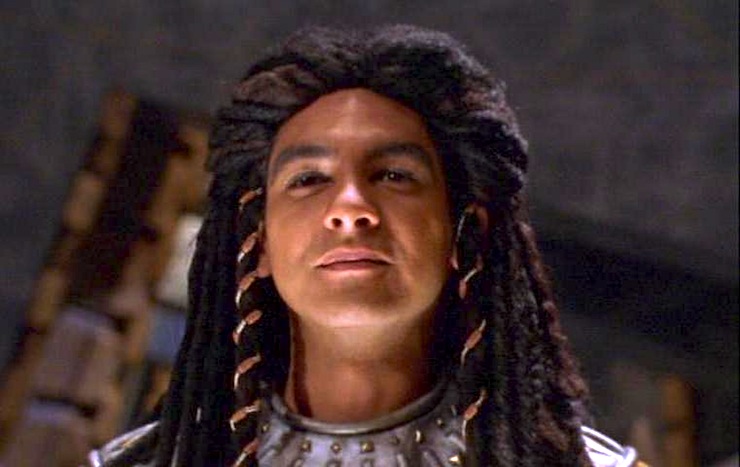
Trivial matters. Fraiser says that Jackson has no family history of mental illness in “Legacy,” yet we meet his institutionalized grandfather in “Crystal Skull.”
We finally meet Sokar, who’s played by David Palffy. Sokar is covered in burns, and because of that, there was some confusion when Palffy was later cast as Anubis, who is also covered in lesions and such.
While Robert Duncan’s Seth is killed in the episode in which he’s introduced, the System Lords we meet in “Fair Game” (Vince Crestejo’s Yu, Jacqueline Samuda’s Nirrti, and Ron Halder’s Cronus) will all recur for many more episodes. (Duncan previously played the image of Jackson’s father in season 2’s “The Gameskeeper.”)
The Goa’uld will continue to honor the protected planets treaty signed in “Fair Game” in theory, but in practice they will try to find workarounds (notably in “Between Two Fires” and “Failsafe”).
Famous comedian Dom DeLuise was cast in the title role of “Urgo,” which is a bit of nepotism, as Dom’s son Peter is at this point one of SG-1’s most prolific directors (he directed seven third-season episodes, including the one his father guested in), and would in the fourth season become a prolific writer as well. Having said that, it’s Dom freakin’ DeLuise…
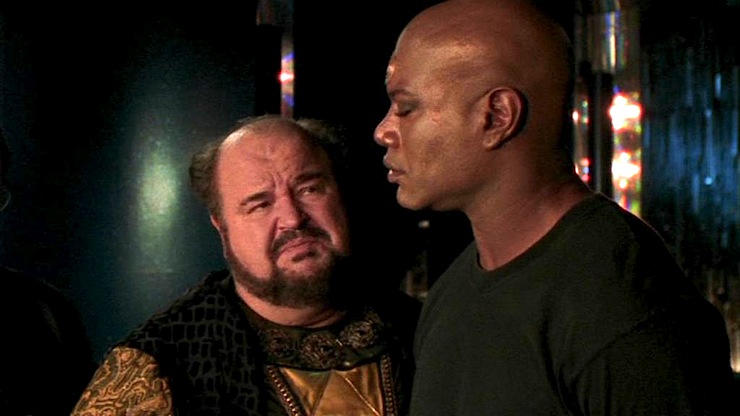
Hammond orders the quantum mirror destroyed at the end of “Point of View,” so it can’t be used again.
The giant aliens who are apparent enemies of the Goa’uld in “Crystal Skull” are never seen nor mentioned onscreen again.
Both Carmen Argenziano and Tony Amendola continue to recur as Jacob and Bra’tac, respectively. JR Bourne and Colin Cunningham return from their one-shot turns as, respectively, Martouf/Lantash and Major Paul Davis, and both will continue to recur. (Davis in particular becomes a reliable character, a nice change from the clichéd hardasses like Maybourne and Samuels).
Chevron seven locked. This season solidified SG-1 as a show that valued its own continuity. While never heavily serialized, the show proves this season especially that it will continue to be aware of its own past and will build on what’s come before, even if it’s something small like Carter using Sokar’s method of attacking the SGC in “Serpent’s Song” to get through the buried gate in “A Hundred Days,” or encountering one of Machello’s many anti-Goa’uld weapons.
What’s best about this season is that they don’t rest on their laurels, instead committing to expanding the universe (showing us more of the Asgard, more of the Tok’ra, more of the Tollan, and more of the Goa’uld, as well as introducing the replicators), and also letting storylines finish. Having arrived in the third season, the show is willing to actually bring the two major storylines from “Children of the Gods” to a conclusion by ending the arcs for both Sha’re and Skaara being kidnapped by Apophis. Only one of those is a happy ending: Skaara being separated from Klorel and returned to Abydos in “Pretense.” Jackson loses his wife, but gains a new purpose, thus preventing him from leaving the show in “Forever and a Day,” which cleverly shows several possible outcomes of Sha’re’s death.
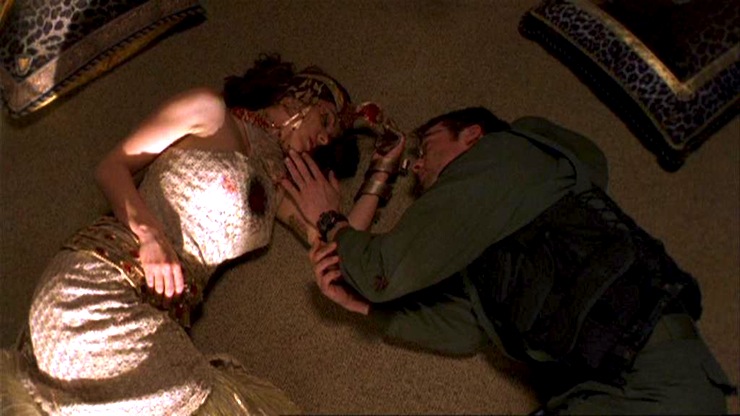
In addition, we remember that this is a modern military organization, and that means that people do get promoted. Carter is promoted to major in a lovely ceremony that’s interrupted by an Asgard transporter (not the last time the Asgard will snatch O’Neill away in mid-sentence), and later we see Fraiser with major’s clusters as well.
In general, this is an enjoyable season that moves things forward and keeps things entertaining.
Keith R.A. DeCandido is hard at work on Kali’s Wrath, an SG-1 novel taking place in the fifth season. His Carter-and-Teal’c story “Time Keeps on Slippin’”—which fills in the gap between seasons three and four—can be seen in the anthology Far Horizons.










